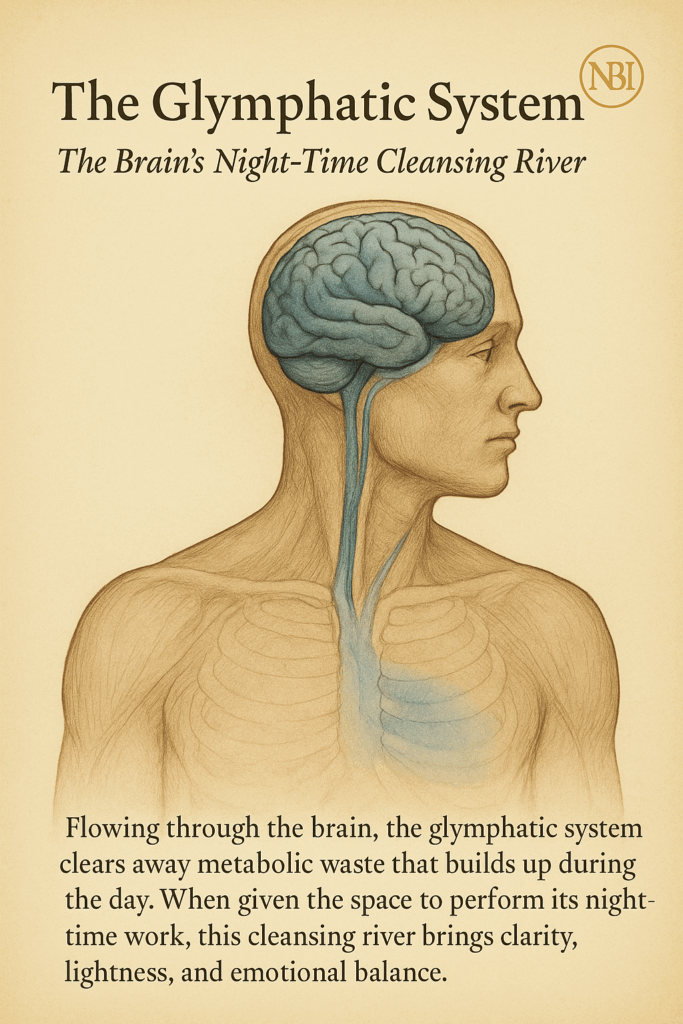Deep within the quiet of the night, while the body lies still and the world softens around us, another river begins its flow. It is the glymphatic system — the brain’s own cleansing network, moving silently through the tissues to wash away the waste of waking life. Most people have never heard of it, yet it plays one of the most vital roles in our clarity, memory, emotions, and sense of inner balance.
The glymphatic system functions like a companion to the lymphatic system, but instead of sweeping through the muscles and organs, it moves through the brain and spinal cord. It works by sending cerebrospinal fluid deep into the brain tissue, flushing out the metabolic by-products that accumulate as we think, move, worry, process emotions, and live through our days. In Natural Hygiene terms, it is the brain’s own channel of elimination — one that depends entirely on rest to operate.
This river does not flow during stress. It does not flow during stimulation. It does not flow when the body is digesting heavy food or when the mind is racing. It comes alive only during deep, unbroken sleep. As the brain slips into its slow-wave state, the cells shrink slightly to create space between them, allowing the fluid to move through like a tide washing the shores. This clearing of acids, toxins, and cellular debris is what gives us that sense of freshness, clarity, and emotional stability when we wake.
But when the internal terrain becomes burdened, something changes. Late nights, stimulants, screens, emotional strain, overeating, and chronic worry all interfere with the glymphatic rhythm. Without deep sleep and internal calm, the brain cannot cleanse. Waste accumulates. And this stagnation shows itself in countless ways: morning grogginess, headaches, brain fog, memory lapses, irritability, difficulty focusing, mood swings, and a sense of heaviness behind the eyes. Some people describe it as feeling “tired inside the mind.”
Natural Hygiene teaches that none of this is random. These signals are the brain’s way of asking for conditions that support purification. The glymphatic system thrives on simplicity — early nights, calm evenings, clean food, and a peaceful emotional environment. Fasting also plays a powerful role, because without the metabolic burden of digestion, the body can shift its energy toward deep repair. This is why many people feel mentally clearer after even a short period of fasting.
Hydration is equally essential. The glymphatic system relies on fluid movement, and when the body is dehydrated, the flow slows. Water-rich fruits, sunlight, gentle movement, deep breathing, and emotional release all help restore the natural rhythm. Even posture matters — the system drains most effectively when we sleep on our sides, a small detail that nature seems to have woven into us from birth.
As balance returns, the brain begins to clear again. Thoughts become lighter. Memory sharpens. Emotions feel more manageable. The world seems brighter, and the inner noise fades. People often describe a renewed sense of mental spaciousness, as though someone opened a window and let fresh air into the mind. This is the glymphatic river functioning as nature intended — washing, renewing, and resetting the delicate landscape of the brain.
The glymphatic system reminds us that healing is not loud; it is quiet. It happens in the dark, in the softness of sleep, in the moments when we let go. It shows us that clarity is not something we force but something we allow. And when we honour the body’s need for true rest, the brain rewards us with energy, focus, emotional harmony, and a deeper sense of self.
When the mind feels heavy or cluttered, it may not be a psychological issue at all. It may simply be the brain asking for more time to cleanse. And when we give it that time, this extraordinary night-time river awakens — dissolving the weight we didn’t realise we were carrying.

